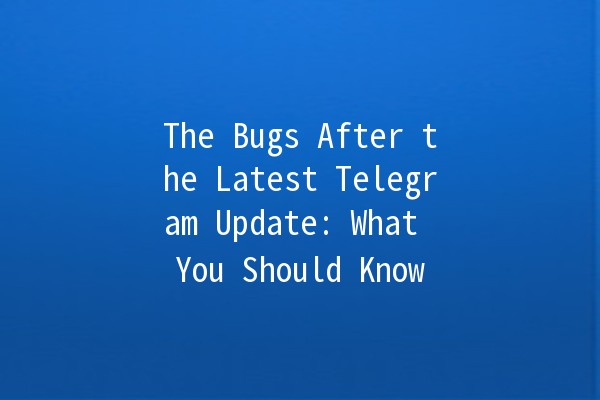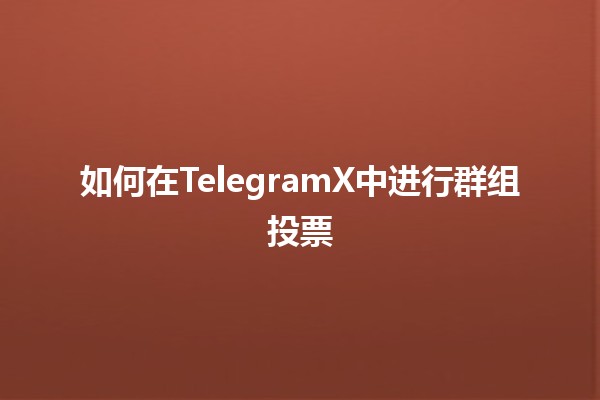🚨 The Bugs After the Latest Telegram Update: What You Should Know 🐞

Telegram has gained immense popularity over the years as a secure messaging platform that offers numerous features for users around the globe. With each update, it introduces new functionalities designed to enhance user experience. However, like any software, updates can lead to unforeseen bugs and glitches that may hinder the platform's performance. In this article, we'll delve into the bugs that have been identified after the latest Telegram update, exploring their nature, causes, and potential solutions.
Understanding the Latest Update
Before diving into the bugs, it is essential to understand what the latest update brought to the table. This specific update focused on enhancing user interface and introducing advanced features such as improved group management tools, better multimedia sharing capabilities, and enhanced privacy settings. While these updates are generally welcomed by users, they can inadvertently introduce new issues, leading to a range of bugs that can affect user experience.
Key Features Introduced in the Update

Despite these advancements, many users have reported various bugs that have arisen since the update. Let us explore some of the most commonly encountered issues.
Common Bugs Reported PostUpdate
A significant number of users have reported that the app frequently crashes or freezes, especially during highvolume usage times or when sharing multimedia files. This issue can be frustrating as it interrupts conversations and may result in lost messages or data.
Possible Causes
Incompatibility: Older devices may struggle to run the new iteration of the app efficiently, leading to performance issues.
High Resource Usage: The new features, while exciting, can increase resource demands on the app, leading to instability.
Another prevalent issue has been the failure of notifications to appear. Users have reported that they do not receive alerts for new messages, which can lead to missed conversations, especially in group chats.
Possible Causes
Notification Settings Changed: In some cases, the update might inadvertently change notification settings for certain chats or groups.
App Permissions: Changes in app permissions can affect how notifications are delivered.
With the enhanced multimedia sharing capabilities came issues related to file uploads and downloads. Users have complained about failing to send or receive certain types of media files.
Possible Causes
File Size Restrictions: Although the file size limits have been increased, users still experience issues with larger files that exceed the new limits.
Format Compatibility: Some users have reported issues with sending media files in specific formats that are not properly supported by the new update.
Users have encountered prolonged loading screens when opening chats or retrieving messages, which can be especially concerning for those in hightraffic groups.
Possible Causes
Server Load: Given the influx of users following the update, server overload might be a factor contributing to slow loading times.
Network Issues: Users with unstable internet connections may experience problems that exacerbate loading delays.
Some users have reported that messages do not sync correctly across devices. This discrepancy can lead to confusion when users switch between their phone and desktop applications.
Possible Causes
Account Configuration Changes: The update may have altered settings that influence how message syncing functions.
ServerSide Updates: Fluctuations in server updates can cause temporary syncing issues.
Troubleshooting the Bugs
While bugs can be frustrating, many of the issues reported after the Telegram update can potentially be resolved through a few troubleshooting steps. Below are some common strategies.
Ensure that you have the latest version of the Telegram app installed. Developers regularly release patches to address known bugs after major updates.
Temporary Files: Clearing the app’s cache can help eliminate temporary files that may have become corrupt during the update process.
Check your notification settings to ensure that alerts are enabled for the necessary chats or groups. Sometimes, app updates can reset personal preferences:
A simple yet effective troubleshooting technique is to restart your device. This can help reset connections and clear any lingering issues caused by the update.
If problems persist, consider uninstalling and reinstalling the app. This can often resolve deeper issues that may not be fixed with other methods.
Community Feedback
Telegram's user community is often a valuable resource for identifying bugs and finding solutions. Forums and social media platforms are buzzing with feedback from users who share their experiences.
Gathering s
In addition to monitoring official Telegram announcements, consider following popular Telegram channels that focus on tech updates and user experiences. These platforms can provide useful insights and tips about dealing with the bugs.
Reporting Bugs
It is also crucial for users to report bugs they encounter directly to Telegram. This feedback contributes to a more stable and efficient application over time. Users can report bugs via:
Inapp support functions.
Official Telegram channels or forums.
Social media platforms.
While the latest Telegram update has introduced exciting new features and enhanced user experience, it has also led to various bugs and glitches. From app crashes to notification failures, users have encountered issues that disrupt their communication experience. By understanding these bugs and how to troubleshoot them, users can navigate the challenges posed by the update.
As Telegram continues to evolve, user feedback and reporting play an integral role in shaping its reliability and performance. Staying informed, regularly updating the app, and participating in community discussions can significantly enhance your Telegram experience.
In the dynamic world of messaging apps, glitches might happen, but with the right knowhow, you can keep your chats flowing smoothly. Happy messaging!
Other News

如何在TelegramX中进行群组投票 🤖📊

Telegram安装时间优化 🚀📱

Telegram Mac版下載地址及其特色功能探索!
